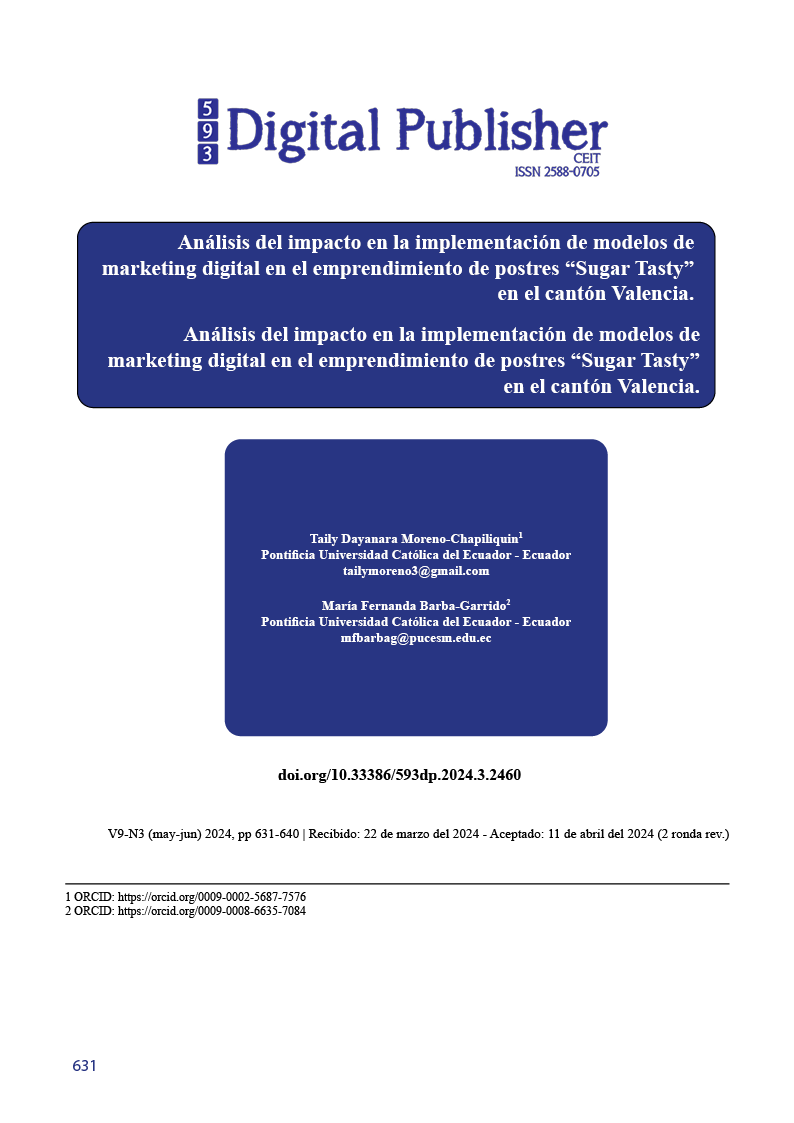Análisis del impacto en la implementación de modelos de marketing digital en el emprendimiento de postres “Sugar Tasty” en el cantón Valencia
Contenido principal del artículo
Resumen
Este trabajo analiza la implementación de modelos de embudo de marketing digital en el emprendimiento de postres "Sugar Tasty" en Valencia, Ecuador. El objetivo es determinar el modelo más adecuado para impulsar las ventas mediante estrategias digitales efectivas. Se evaluaron los modelos AIDA y TOFU-MOFU-BOFU a través de una investigación cuantitativa no experimental, con enfoque transversal. Se realizó un cuestionario a 10 clientes. Los resultados revelaron que Instagram y Facebook son las redes sociales preferidas para buscar postres, con alta confianza en influencers y testimonios. Los clientes desean recibir promociones, muestras gratis y proporcionar datos para más información. Se concluye que el modelo AIDA es el más conveniente, al adaptarse a las preferencias identificadas y permitir una conexión efectiva mediante estrategias en redes sociales, colaboraciones con influencers y resaltar testimonios para captar atención, generar interés, despertar deseo y facilitar la compra. Se recomienda implementar el embudo AIDA, enfocado en Instagram y Facebook, aprovechando influencers y clientes satisfechos
Descargas
Detalles del artículo

Esta obra está bajo una licencia internacional Creative Commons Atribución-NoComercial-CompartirIgual 4.0.
1. Derechos de autor
Las obras que se publican en 593 Digital Publisher CEIT están sujetas a los siguientes términos:
1.1. 593 Digital Publisher CEIT, conserva los derechos patrimoniales (copyright) de las obras publicadas, favorece y permite la reutilización de las mismas bajo la licencia Licencia Creative Commons 4.0 de Reconocimiento-NoComercial-CompartirIgual 4.0, por lo cual se pueden copiar, usar, difundir, transmitir y exponer públicamente, siempre que:
1.1.a. Se cite la autoría y fuente original de su publicación (revista, editorial, URL).
1.1.b. No se usen para fines comerciales u onerosos.
1.1.c. Se mencione la existencia y especificaciones de esta licencia de uso.
Citas
Blanco Lora, I., & Segarra Oña, M. D. V. (2013). Estudio exploratorio del uso del e-Marketing como estrategia para micro, pequeñas y medianas empresas de servicios. Puente. Revista Científica.”
Chaffey, D., & Ellis-Chadwick, F. (2019). Marketing digital: estrategia, implementación y práctica (7a ed.). Pearson Educación.
Espinosa, R. (2017). Que es el modelo AIDA en marketing.
Elisabeth B. (2018). “El uso de WhatsApp para el acompañamiento y fomento del trabajo colaborativo en cursos virtuales de educación continua”.
Freinderberg, L (2019) “Marketing Digital para todos, el paso a paso para crear campañas exitosas en las redes sociales”.https://mododigital.uy/uploads/tutorial/Marketing-Digital-interior-WEB%20-%20Leo%20Freidenberg.pdf
Gordon E., (2023) “Desarrollo de un modelo de marketing digital para una MIPYME comercial del sector de repuestos automotrices ubicada en el norte de Quito”
Guipe, R; López, A(2009). “E-Marketing como ventaja competitiva en las empresas de hospedajeturístico en el Estado de Sucre” obtenido de https://m.riunet.upv.es/bitstream/handle/10251/27931/Estudio%20Exploratorio%20del%20uso%20del%20E-Marketing%20A4.pdf?sequence=1&isAllowed=y
Jaramillo, J. (2019). “Analisis de mercado para la implementación de una APP móvil como un nuevo canal de comercialización de gas licuado de petróleo (GLP) en Quito, Ecuador.”http://repositorio.puce.edu.ec/bitstream/handle/22000/17290/TESIS%20MAEST R%c3%8dA%20FINAL%20v4%20140819%20Jessenia%20Jaramillo.pdf?sequ ence=1&isAllowed=y
Casal, J & Mateu, E. (2003), “Tipos de Muestreo” CReSA. Centre de Recerca en Sanitat Animal / Dep. Sanitat i Anatomia Animals, Universitat Autònoma de Barcelona, 08193-Bellaterra, Barcelona
Kotler, P., & Armstrong, G. (2018). Fundamentos de marketing (13a ed.). Pearson Educación.
Laudon, K. C., & Guercio Traver, C. (2020). E-commerce 2020: business, technology and society (16a ed.). Pearson Education
Munch Galindo, L.(2017). “Nuevos fundamentos de mercadotecnia”. Trillas.
Muñoz, A (2022), “Análisis de estrategias de Marketing Digital para los emprendimientos de repostería en Guayaquil” https://dspace.ups.edu.ec/bitstream/123456789/23258/4/UPS-GT003938.pdf
Muñoz, A., & Herrera, F. (2022). Análisis de estrategias de Marketing Digital para los emprendimientos de repostería en Guayaquil. Editorial UPS
Ordoñez Altamirano , L. G., Valencia Trujillo, K. A., & José Luis López Salazar. (2020). Emprendimiento e Innovación en Ecuador . Investigación Académica
Sambada, J & Bhayani, S. (2021). An Empirical Analysis of Consumers’ Perceptions of Privacy Protection. Asian Journal of Economics, Business and Accounting
Selman H (2017), “Marketing Digital” Ibuku.Publishing
Viteri F., Herrera L.,Bazurto A. (2018) “Importancia de las técnicas del marketing digital” https://dialnet.unirioja.es/servlet/articulo?codigo=6732914



